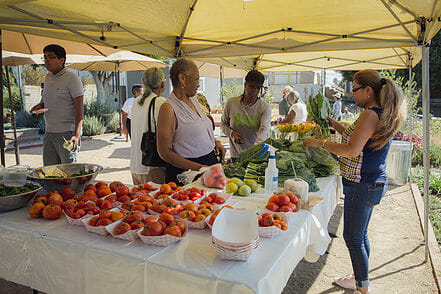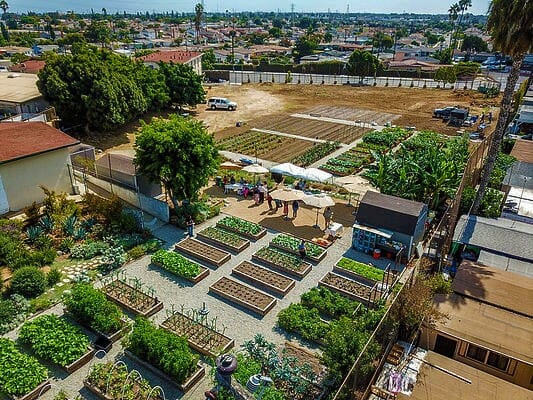
Support EcoJustice Radio with a Tax-Deductible Donation
Subscribe to EcoJustice Radio: Apple Podcasts | SoundCloud | Google | Spotify | Stitcher | YouTube | Links


ALMA Backyard Farms: Reclaiming Lives and Land in Los Angeles
Communities of color facing racial prejudice and social injustice are looking to urban farming to solve problems of food insecurity and mass incarceration. Alma Backyard Farms fosters a connection to the land as a new kind of re-entry restorative justice for formerly incarcerated people, their families, and the communities in which they live.
STORY: Detroit Works: Urban Farming and Reforestation as Neighborhood Preservation
Amidst the backdrop of the pandemic, 2020 was a year that highlighted food insecurity, especially in cities and communities of color. It also exposed the raw depths of racial and socioeconomic injustices in this country.
STORY: 1000 Tiny Farms: A Regenerative Network
The prison industrial complex and mass incarceration in the U.S. continues to perpetuate and profit off of racial prejudice and disempowerment; recidivism rates remain a staggering 70% within 5 years of release from prison in the U.S. With the largest prison population in the world, the U.S. has an estimated 2 million people in the criminal justice system at any given time. Despite these alarming numbers, people and communities are now reclaiming the word justice itself and what it might look like, particularly for re-entry.
In this episode, Erika Cuellar and Richard Garcia, Co-Founders of Alma Backyard Farms,discuss their work to re-claim the lives of formerly incarcerated people, re-purpose land into productive urban farms, and re-imagine disenfranchised communities in LA as a hub for transformation through their job training program, place-based youth education, and organic farmstand. According to ALMA, growing food is the “ultimate rehabilitation.”
STORY: Empowering Community Through Urban Farming – EcoJustice Radio


*Richard D. Garcia, Co-founder & Executive Director of ALMA Backyard Farms, inherited his passion to grow food from a long-line of Filipino farmers. Born and raised in Los Angeles, California he studied at St. John’s Seminary College and has extensive experience in pastoral ministry inside juvenile halls and prisons. As a pastoral minister, youth advocate, and urban farmer, Richard knows how growing food is a transformative way of bringing people together. Since completing an M.A.in Pastoral Theology at Loyola Marymount University, Richard incorporates principles of restorative justice into urban farming.
*Erika L. Cuellar, Co-founder & Operations Director, is a first generation Mexican-American who grew up in Watts, California. She witnessed how her community has been fraught with challenges in education and food insecurity, and pursued a degree in Education at Loyola Marymount University. Erika applied her studies to empower previously incarcerated women and men at Homegirl Cafe, a division of Homeboy Industries. Her years of social enterprise management ensures the integrity of ALMA Backyard Farms’ mission and its financial viability.
STORY: A Farm Grows in LA: Urban Farming with Avenue 33
Urban farming to solve food insecurity & mass incarceration? @almabackydfarms fosters a connection to the land as a new kind of re-entry restorative justice for formerly incarcerated people & the communities in which they live. Listen here: https://t.co/Qt1p7KmFJj#AlmaStyle pic.twitter.com/DOIC64J7XC
— EcoJusticeRadio (@EcoJusticeRadio) June 18, 2021
Podcast Website: http://ecojusticeradio.org/
Podcast Blog: https://wilderutopia.com/category/ecojustice-radio/
Support the Podcast: https://socal350.org/contribute-to-socal-350-climate-action/
Executive Producer: Jack Eidt
Interview by Carry Kim
Intro by Jessica Aldridge
Engineer: Blake Lampkin
Show Created by Mark and JP Morris
Music: Javier Kadry
Episode 103
Image: ALMA Backyard Farms
Updated 23 October 2021
Podcast: Play in new window | Download









Pingback: A Farm Grows in LA: Urban Farming with Avenue 33
Pingback: 1000 Tiny Farms: A Regenerative Network